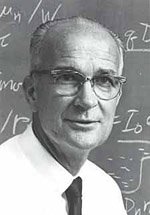
William Bradford Shockley (b. London, 1910 - d. Stanford, 1989)
I have a special fondness for reading about the lives of great scientists. It is often found that men are as brilliant examples in their work and in personal relationships or in their particular beliefs are the least. Most times the genius comes with eccentric and often attitudes beliefs and actions are difficult to assimilate for ordinary mortals. An example of what I say is William Shockley, one of the minds that shaped the world as we know it today, Nobel Prize winner in Physics in 1956 and dogged advocate of racial theories and eugenics really shocking taken to extremes .
Shockley was born in London in 1910, the son of an engineer and surveyor who decided they could give your child a perfect education without leaving home, soon stood out for its high intellectual level as much as for their difficulties in understanding others . He studied at the California Institute of Technology (Cal Tech), a Ph.D. from MIT in 1936 and immediately went to work at Bell Labs in New Jersey, where he quickly developed several patents. During the war he worked on several projects related to radar and antisubmarine warfare, for which he received the Medal of Merit in 1946.
After the war continued in the laboratories of Bell, who was then looking for an alternative to vacuum lamps as amplifiers of electrons. A Shockley came up with using an electric field that increased the conductivity of the semiconductor on which it is applied. And on this idea John Bardeen and Walter Brattain managed to build the first transistor in 1947. Although Shockley had suggested the idea starting and participating in some stages of theoretical development, not figured in several subsequent patents because their idea of \u200b\u200bthe electric field had been patented in the thirties by Julius Lilienfeld , so Shockley, feeling cheated, continued working independently and in the years that followed almost revolutionized the world of electronics with their progress. In 1951 he patented the junction transistor that completely overtook the market earlier. That same year he was appointed a member of the National Academy of Sciences. Despite all this display of genius, the truth is that Shockley was at best a difficult person to deal with, what I fell out with his staff and it appears that stopped him from moving up the Bell, so in 1955 decided to become independent and create your own company, Shockley Semiconductor Laboratory , and tried to take some of his former colleagues from Bell. None accepted. In 1954 also had divorced his first wife to marry again next year with a professor of nursing. It seems that the front of your character worse company, and started to become quite paranoid. In 1956 he received the Nobel Prize along with Bardeen and Brattain to those who held some time despite not speaking. In 1957 Shockley refused to work with new silicon transistors, which made eight of its engineers left the company and founded Fairchild Semiconductor that, together with Texas Instruments , would create the first integrated circuits and would be the basis for the later Intel . Finally, in 1961, Shockley sold his business and he taught at Stanford until his death in 1989 for prostate cancer. In those years still managed several patents in the electronics field, but his bad temper made him away to their children, who learned the news of his death by the press.
Apart from the above, during the last decades of his life Shockley became interested in eugenics. I thought America had a serious problem dysgenesis as less intelligent people tend to reproduce more, so in theory people tended to become less and less intelligent. A Shockley seems that he was concerned especially blacks, who thought they were less intelligent than whites according to general studies of IQ Arthur Jensen, who in 1969 published an article which stated that blacks were on average half an IQ 15 points lower than whites, and that this difference was not due to genetics and socially depressed environment in which they lived the majority of African Americans in the 60's. Convinced of his ideas, Shockley is dedicated to spreading by the United States through a campaign of lectures and even proposed it would be nice to offer money to anyone who had an IQ below 100 to be left sterile. Of course all this caused quite a stir in the university of Stanford, getting students to burn his effigy. His obsession even led him to persuade the billionaire Robert Klark Graham to create the Repository for Germinal Choice , a sperm bank which would keep the best genes among which were those of Nobel laureates and their own course.
must be said that the controversy over the CI continues today. At the end of the 70 published another study which stated that the Japanese gave on average 15 points higher on the test than white Americans. Obviously, the same voices who advocated that the difference between whites and blacks was genetic opted this time for a deficiency in the American school system.
No comments:
Post a Comment